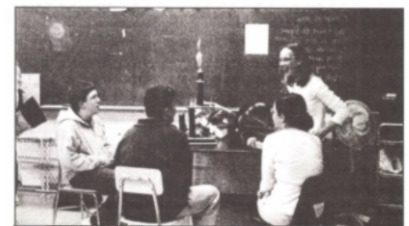A glance into the past: One of Wunn’s
In a walk down memory lane, Kamakshee Kuchhal ’24 examines an ’04 high school student’s debate journey and contrasts it with her own.

“One of Wunn’s” by Drew Parker, originally published in the Feb. 7, 2009 issue of WSS
For a lot of students at West, freshman year is looked back upon fondly as a time to adjust to high school life, unburdened by excessive homework —after all, learning new locker combinations and getting used to a school with three floors instead of two was just so difficult, wasn’t it? And while some of us spent freshman year in a listless stupor, there were a select few decided that the life of the sleepy slacker and committed couch-potato just wasn’t for them. Take Margaret Weirich ‘04, who spent the first part of her freshman year unsatisfied and restless until she decided to try debate as a way to fill her time and discovered soon after that she found the activity to be an enlightening and enjoyable way to spend her after-school hours.
“You get to learn about a lot of things you normally wouldn’t,” said Weirich. “I find it really challenging and fun.”
Weirich was originally born in Los Angeles, but moved to Iowa City when she was two and has resided here since. She’s quick to praise the quality of education and number of opportunities available to students at West —and with good reason, considering her participation in Book Club, Favonius, and an after-school cultural exchange program with Pakistani students in addition to her activity with debate.
“The number of things available to me here is amazing,” said Weirich. “It’s great because I never run out of things to do.”
Considering the time required to participate in debate, it seems a minor miracle that she is able to participate in any other activities at all. For her particular style of debate (called policy debate), practice is held Monday-Wednesday for two hours or more, with an additional practice added in occasionally before tournaments. A large burden on its own, without the added weight of the competitions themselves, tournaments that can often consume the entire weekend. With so much to do and so little time to do it, debaters are often left in between a rock and a hard place, forced to make difficult choices about whether to spend their middling free time on their debate work or their homework.
“It’s really hard sometimes because you have tests right after tournaments sometimes, and you have to prioritize and make sure to get done as much as you can manage a hard school schedule with debate obligations too,” said Weirich.
It seems inevitable that such a full schedule would lead to a little bit of stress, and while Weirich admits that the stress can be a problem with debaters, she says she manages to find different ways to make sure that she doesn’t burn out.
“I’m quite often stressed out,” said Weirich. “I’m not one of those people that’s perfectly built to deal with the stress, but I find ways to cope with it.”
Though boredom may have had some influence on Weirich’s motivation to join debate, another facet of debate that she found attractive was the sort of people that participated. According to Weirich, it’s the community of debaters both at West and across the nation that make Debate such a positive experience.
“It’s introduced me to so many different people. I never think of the weekends lost because I get to see my friends that live in New York, or Chicago, or whatever, and I get to see them on weekends, so that’s very exciting for me,” said Weirich. “Debate has a great community that’s full of fascinating people, and it’s great to be able to associate with those people.”
Yet Weirich’s involvement in debate goes beyond mere participation. Not only does she take an active role in organizing and overseeing debate functions that are held at West, but she also makes sure to provide a leadership role within the team and provide an example for the younger debaters.
“It’s very important that the senior members of a debate team help the younger debaters gain from the senior debaters, and vice versa,” said Weirich.
In the end, Weirich is pleased with her decision to join debate, and heartily recommends it to others, though with some reservations attached.
“I would say if you don’t have the time for it, choose a style of debate, like Congress, that are better for people with only a little bit of time requirement,” said Weirich. “But while it always seems like I have a million different things to do at one time, I never regret my decision to join Debate.”
Reflections
As a freshman policy debater myself, I should’ve expected to be drawn to Margaret Weirich’s story about her first year doing debate. I decided to try it for most of the same reasons she did; the challenge is what made it fun. On my very first practice, I told my coach I had no idea swimming would help me do better at this activity. When he laughed and said, “You’d be surprised by how good cardio exercise helps with debate,” I knew this was exactly what I wanted to do.
Of course, adding a time-consuming activity to an already filled schedule isn’t the smartest decision. However, just like Weirich explains, being able to prioritize is key to be able to balance all of your other activities as well. Getting overwhelmed is easy too; tournament burn-outs still exist. It’s important to find ways to deal with the stress, and if it’s not with coping methods like Weirich talks about, needing a break is definitely understandable.
With my first introduction to debate being in middle school, before the pandemic, I only had the experience of going to one in-person tournament. Even though it was so long ago, I’ll never forget the memories I made within my rounds; whether that was with my team or even my opponents. What Weirich mentions, in the 2000s, is something I look forward to one day after COVID-19 is over, where traveling to different places will just be another incentive to keep debating.
The team dynamic mentioned throughout the article makes me proud to be part of the West High Debate Team. Considering when this article was written, it hasn’t changed at all throughout the years. The proof of seniors and coaches being more than generous with their time is us, as newer teammates, not failing entire tournaments. The atmosphere that is created within the team is welcoming and carries a fun vibe that never fails to hype you up (even if you lose a round).
I must admit, there’s something addicting about the way you can pick out specific arguments within a speech, find their flaws, and construct a rebuttal that never gets old. Not only is it a lifelong skill many people gain, but an academic or career path some can look forward to. Within the stress of policy rounds from rapid-fire speaking and taking notes, called flows, it’s easy to forget that you’re also giving yourself a new perspective —another pair of lenses to look at the world around you.
I had a friend interview me about why I did debate. She laughed at me when I couldn’t think of an answer. It wasn’t because I couldn’t find one; I simply didn’t know how to put it into words. In the end, I said, “To me, the best thing about debate isn’t winning the round or even a tournament. It’s the rush of adrenaline after losing a round but coming out of it feeling like you learned something.” I think Weirich would agree with me.
Your donation will support the student journalists of West High School. Your contribution will allow us to purchase Scholarship Yearbooks, newsroom equipment and cover our annual website hosting costs.

(she/her) Kamakshee Kuchhal is a senior at West High School and is super excited for her third (and last) year on West Side Story Print Staff. Besides...



anonymous • Feb 28, 2021 at 11:43 am
Amazing read, loved it!